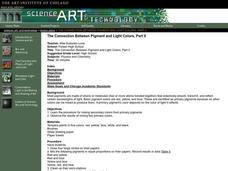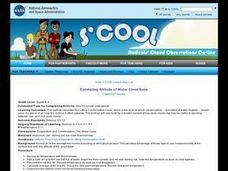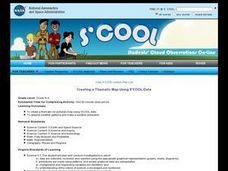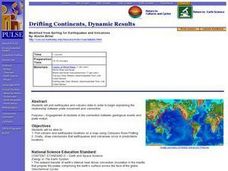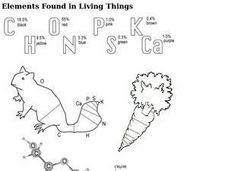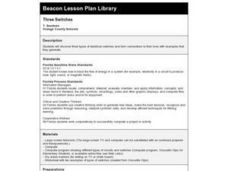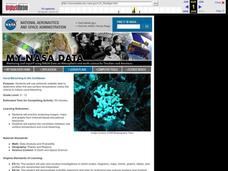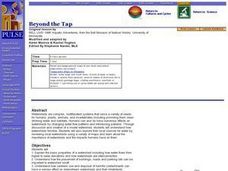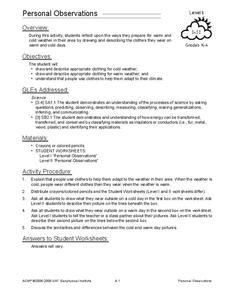Curated OER
The Connection Between Pigment and Light Colors
High schoolers learn the procedure for mixing secondary colors from primary pigments and observe the results of mixing two primary colors.
Curated OER
Climate and Topography, What Is the Connection?
Fourth graders study Neumann's world continent map and explore topography and climate.
Curated OER
Sounds Like Science - Jamboree
Students create a delightful-sounding ensemble. They explore the subjective distinctions between noise and music. They use jars, buckets, boxes, strings, rackets, frames, string, rubber bands and bottles to make their own jamboree.
Curated OER
Hurricane Scavenger Hunt
Fourth graders use Internet and/or library resources to locate and record information about hurricanes on a worksheet..
Curated OER
Estimating Altitude of Water Cloud Base
Young scholars conduct an experiment to determine dew point and use a formula to detemine altitude. They construct a chart and predict what altitude clouds would form, given the dew point on the ground.
Curated OER
Creating a Thematic Map Using S'COOL Data
Students observe weather patterns, collect data, and make a weather predictions for various locations on a map.
Curated OER
Drifting Continents, Dynamic Results
Students plot earthquake and volcano data using a Compass Rose Plotting. They explain the relationship between plate movement and connection. They draw conclusions that earthquakes and volcanoes occur in predictable locations.
Curated OER
Natural Hazards
Students evaluate the hazards of naturally occurring events. After watching a video concerning safety hazards, students work in groups to discuss the safety issues involved in taking a trip to a mountainous region. Recommendations are...
Curated OER
Satellite Mobiles
Students discuss satellites and their functions. They design and construct their own satellite out of readily available materials. Students are taught the definition of a satellite. They discuss the two main purposes of satellites:...
Curated OER
Elements Found in Living Things
In this elements worksheet, students review the most common elements found in living things. Students color in two pictures with the percentages of the elements found in that living thing.
Curated OER
Electroplating for Corrosion Protection: Redox in Action
High schoolers define what a redox reaction is. In this chemistry activity, students electroplate some wires in the lab. They research the application of electroplating in the real world.
Curated OER
The Physics of Electricity: Real or Magic?
Eighth graders participate in various demonstrations on electricity. In this physics lesson, 8th graders explore static and current electricity. They apply concepts to real world situations.
Curated OER
Tune Up Your Ears!
Learners discuss meaning of pitch, listen for different sounds in classroom, hallway, and outdoors, and listen to sounds played on piano and on computer to determine high or low pitch.
Curated OER
Three Switches
Students describe the types and parts of a circuit. They discover three types of electrical switches and create a chart showing the many uses for each type of switch.
Curated OER
Adaptable Mandibles
Students define adaptation and highlight example of adaptation in birds and other animals. They study feeding techniques of seabirds and investigate the effect that trash has on wildlife.
Curated OER
Coral Bleaching in the Caribbean
Students use authentic satellite data on the NASA website to determine when the sea surface temperature meets the criteria to induce coral bleaching.
Curated OER
Science: Trouble in the Troposphere
Students research a NASA Website and record information about an assigned city's tropospheric ozone residual monthly climate. In groups, they graph the information for the past year. They form new groups and compare their city's...
Curated OER
Graphing Data - Temperature
Seventh graders measure and record temperature over a given time period. They compare the recorded temperatures to the 40-year recorded normal average temperatures for the same area. Students display and interpret their findings in a graph.
Curated OER
Let Me Tell You About My State
Students develop an awareness of the concepts of the United States through the Amateur Radio communication services by verbally sharing information about their state such as cultures, current events, geography, history and much more.
Curated OER
Beyond the Tap
Students explain the basic properties of a watershed including how water flows from higher to lower elevations and how watersheds are interconnected. They comprehend how the placement of buildings, roads, and parking lots can be...
Curated OER
Using My Nasa Data To Determine Volcanic Activity
Students use NASA satellite data of optical depth as a tool to determine volcanic activity on Reunion Island during 2000-2001. They access the data and utilize Excel to create a graph that has optical depth as a function of time for the...
Curated OER
Bacterium Cells
In this bacteria worksheet, students read several elements of bacterium cells, their diet, types, locations, reproduction, resting stages, effects of, and classification. Students also study a cross-section of bacterium cells.
Curated OER
Worksheet 7/7 on Noun
In this nouns worksheet, students identify all the nouns in a one page text about the food chain. Students circle the 80 nouns in the passage.
Curated OER
Personal Observations
Pupils determine the appropriate clothing for warm and cold weather. In this weather and clothing lesson, students draw and describe appropriate clothing for cold and warm weather.
Other popular searches
- Energy Transfer
- Energy Transfer Diagrams
- Energy Transfer Ecosystem
- Heat Energy Transfer
- Thermal Energy Transfer
- Types of Energy Transfer
- Energy Transfer Experiment
- Food Web Energy Transfer
- Energy Transfer Assessment
- Energy Transfer Wasted
- Energy Transfer Sankey
- Energy Transfer Ecology


